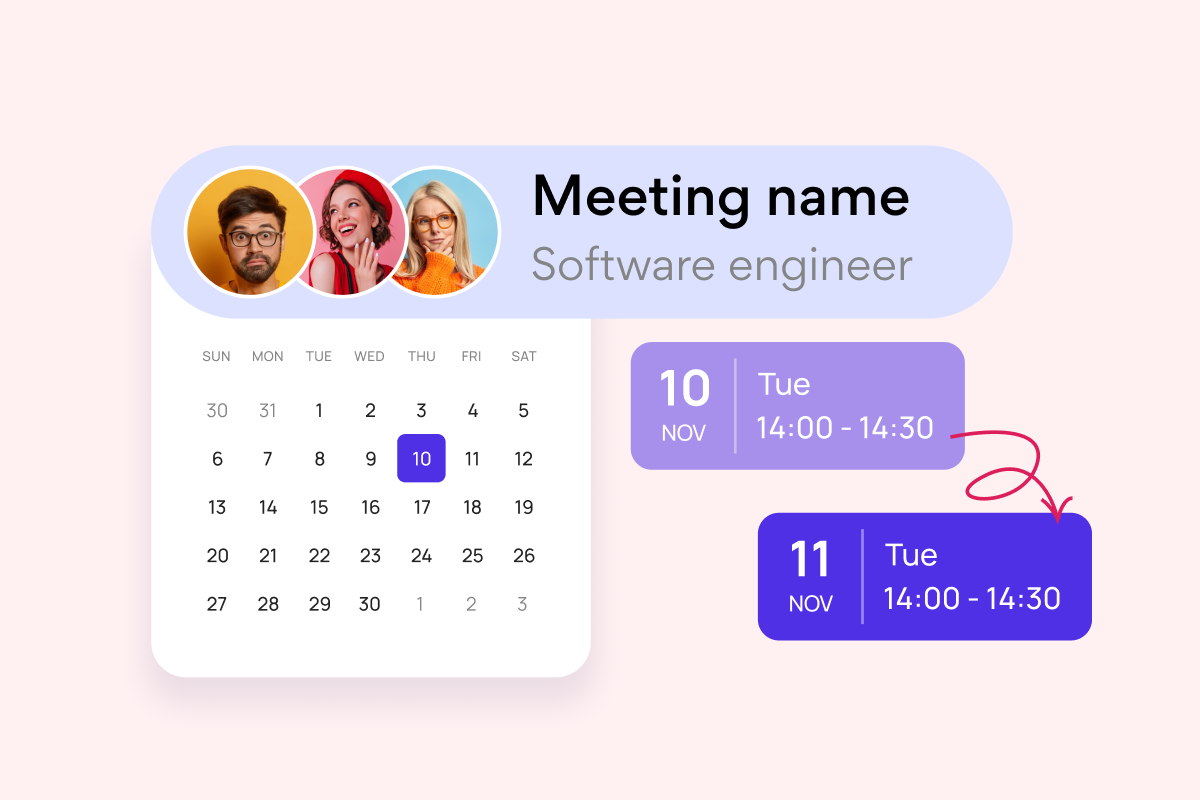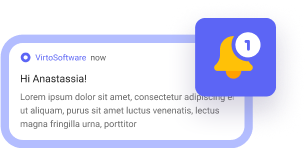Microsoft 365 Apps for Business is a powerful, cloud-based suite of productivity tools designed to help businesses of all sizes work smarter, collaborate effectively, and stay secure. With familiar applications like Word, Excel, PowerPoint, Outlook, and Teams, along with advanced cloud storage and seamless integration across devices, it’s an ideal solution for modern workplaces.
However, choosing the right Microsoft 365 plan isn’t a one-size-fits-all decision—it depends on your business goals, team size, and specific security or compliance needs.
This article is here to guide you through the process. We’ll break down the features, pricing, and key differences between Microsoft 365 business plans, with a focus on Microsoft 365 Apps for Business. You’ll learn what’s included in this plan, who it’s best suited for, and how its capabilities can be expanded to support your business growth. By the end, you’ll have a clear understanding of which plan aligns best with your needs, so you can make an informed choice and unlock the full potential of Microsoft 365 for your team.
What Is Microsoft 365 Apps for Business
In this section, we’ll explore Microsoft 365 Apps for Business in detail—from understanding what exactly it includes to how it differs from other Microsoft plans.
Definition and contents of Microsoft 365 Apps for Business
Microsoft 365 Apps for Business is a cloud-based subscription designed for small to medium-sized businesses that need professional productivity applications. Unlike traditional one-time purchase software, Microsoft 365 ensures that you always have access to the latest versions of Office apps, including regular updates for security and new features.
What do Microsoft 365 Apps for Business include?
- Desktop Applications: Full versions of Word, Excel, PowerPoint, and Outlook, installed directly on your devices.
- Publisher and Access (Windows PCs only).
- Cloud Storage: 1 TB of OneDrive cloud storage per user for secure file storage, backup, and sharing.
- Multi-Device Compatibility: Use on up to 5 devices per user (PCs, Macs, tablets, phones).
- Offline Access: Continue working without internet connectivity, with changes syncing automatically when reconnected.
- Support: Anytime phone and web support.
- Pricing: $8.25 per user/month (with annual commitment).
While Apps for Business offers the core productivity tools, it does not include advanced collaboration tools like Teams, email hosting, or advanced security features found in other plans.
👉 Microsoft 365 for Business vs. Microsoft 365 Apps for Business: What’s the difference? The key difference between Microsoft 365 for Business and Microsoft 365 Apps for Business lies in the range of services they provide. Microsoft 365 for Business includes comprehensive plans like Business Basic, Standard, and Premium, offering core Office apps (Word, Excel, PowerPoint, Outlook) along with cloud services such as Teams, Exchange email, OneDrive, SharePoint, and advanced security and management features. In contrast, Microsoft 365 Apps for Business focuses solely on providing the Office apps across desktop, web, and mobile devices, with 1 TB of OneDrive storage, but it does not include Teams, Exchange email, or advanced security tools. Microsoft 365 Apps for Business is ideal for businesses that only need productivity apps, while Microsoft 365 for Business plans are more suitable for organizations needing a full suite of collaboration, communication, and security tools. Both are designed to support productivity and scalability for small to medium-sized businesses.
Comparing Microsoft 365 business plans
Microsoft offers three additional plans beyond M365 Apps for Business, each offering unique features tailored to different business needs. Below is a detailed comparison:
| Plan | Price | Key Features | Who It’s For |
| Business Basic | $6.00 user/month | – Web and mobile versions of Word, Excel, PowerPoint, Outlook. – Microsoft Teams for chat, calls, and video conferencing. – 1 TB OneDrive storage. – Custom business email. – Basic security and compliance features. – AI-powered assistance with Copilot (add-on). | Ideal for businesses that need cloud-based collaboration tools and basic productivity apps without desktop versions. |
| Business Standard | $12.50 user/month | Everything in Business Basic, plus: – Desktop versions of Word, Excel, PowerPoint, Outlook. – Webinars with attendee registration & reporting. – Collaborative workspaces with Microsoft Loop. – Video editing with Microsoft Clipchamp. – Copilot (add-on). | Best for SMBs that need the full suite of Office desktop apps, advanced collaboration tools, and additional creative tools. |
| Business Premium | $22.00 user/month | Everything in Business Standard, plus: – Enhanced security features (Microsoft Defender, Intune, Purview). – Advanced identity and access management. – Protection against phishing and cyberthreats. – Sensitive data discovery and classification. – Copilot (add-on). | Ideal for businesses requiring enterprise-grade security, advanced compliance features, and device management tools. |
| Apps for Business | $8.25 user/month | – Desktop versions of Word, Excel, PowerPoint, Outlook. – 1 TB OneDrive storage. – Anytime phone and web support. – Copilot (add-on). | Suitable for businesses that need core productivity tools without email hosting or advanced collaboration and security features. |
👉 What are Microsoft business applications? Microsoft business applications refers to a suite of tools and solutions designed to help businesses optimize their operations, improve productivity, and drive growth through automation, data insights, and enhanced collaboration. These applications include customer relationship management (CRM) and enterprise resource planning (ERP) solutions, powered by Microsoft Dynamics 365, as well as tools for business intelligence, analytics, and low-code app development through Power Platform (Power BI, Power Apps, Power Automate, and Power Virtual Agents). However, for the purposes of this article, we’ll be focusing specifically on Microsoft 365 Apps for Business, a subscription plan that provides access to essential Office apps like Word, Excel, PowerPoint, and Outlook across desktop, web, and mobile devices.
Key differences between plans
Each plan balances productivity, collaboration, and security features differently, ensuring there’s an option no matter your business size or priorities. Below, we break down the major features that distinguish these plans, helping you identify which one aligns with your specific requirements.
- Collaboration tools:
- Plans like Business Basic, Standard, and Premium include Microsoft Teams, enabling video meetings, chats, and calls. Apps for Business lacks these tools.
- Security & compliance:
- M365 Business Premium offers enterprise-grade security features like Microsoft Defender, Intune, and Purview for identity protection, endpoint security, and sensitive data protection.
- Business Basic and Standard provide standard security features like spam and malware filtering.
- Desktop apps:
- Only Business Standard, Business Premium, and Apps for Business include the full desktop versions of Office apps. Business Basic offers only web and mobile app versions.
- Email hosting:
- Business Basic, Standard, and Premium provide custom email hosting (you@yourbusiness.com) via Microsoft Exchange. Apps for Business does not include email hosting.
- Advanced features:
- Business Standard introduces tools like Microsoft Loop for collaborative workspaces and Clipchamp for video editing.
- M365 Business Premium includes advanced identity management with Microsoft Entra ID and protects against phishing and ransomware attacks.
What is the difference between Office 365 Home and Office 365 Business plans?
The primary differences between Office 365 Home (now called Microsoft 365 Family) and Microsoft 365 Apps for Business lie in their licensing, management capabilities, support options, collaboration tools, and compliance features. Here’s a breakdown:
- License terms
- Microsoft 365 Family: Licensed strictly for personal, non-commercial use, intended for families or individuals.
- Microsoft 365 Apps for Business: Includes commercial use rights, making it suitable for professional environments.
- Administration capabilities
- Microsoft 365 Family: No centralized management tools; individual users manage their own installations and settings.
- Microsoft 365 Apps for Business: Provides centralized deployment and management tools through the Microsoft 365 Admin Center. IT administrators can control security policies, manage updates, and oversee user settings across the organization.
- Support options
- Microsoft 365 Family: Support is limited to self-service resources like community forums and FAQs.
- Microsoft 365 Apps for Business: Includes professional business-hour phone and web support tailored to business needs.
- Collaboration features
- Microsoft 365 Family: Offers basic collaboration capabilities, such as file sharing via OneDrive and limited co-authoring in Office apps.
- Microsoft 365 Apps for Business: Optimized for team collaboration in professional settings, with features like shared OneDrive libraries and integration with business-specific tools.
- Compliance features
- Microsoft 365 Family: Lacks compliance tools for regulatory requirements.
- Microsoft 365 Apps for Business: Includes compliance capabilities that help businesses meet industry and regulatory standards, such as data protection and security controls.
| Feature category | Microsoft 365 Family | Microsoft 365 Apps for Business |
| License terms | Licensed strictly for personal, non-commercial use, intended for families or individuals. | Includes commercial use rights, making it suitable for professional environments. |
| Administration capabilities | No centralized management tools; individual users manage their own installations and settings. | Provides centralized deployment and management tools through the Microsoft 365 Admin Center. IT administrators can control security policies, manage updates, and oversee user settings across the organization. |
| Support options | Support is limited to self-service resources like community forums and FAQs. | Includes professional business-hour phone and web support tailored to business needs. |
| Collaboration features | Offers basic collaboration capabilities, such as file sharing via OneDrive and limited co-authoring in Office apps. | Optimized for team collaboration in professional settings, with features like shared OneDrive libraries and integration with business-specific tools. |
| Compliance features | Lacks compliance tools for regulatory requirements. | Includes compliance capabilities that help businesses meet industry and regulatory standards, such as data protection and security controls. |
👉 Is Office 365 worth it for small business? Yes, Office 365 (now Microsoft 365) is worth it for small businesses as it provides powerful productivity tools, cloud storage, and collaboration features at an affordable price. Plans like Business Standard or Apps for Business give access to essential applications such as Word, Excel, Outlook, Teams, and OneDrive, enabling seamless work across devices and locations. Its subscription model ensures businesses always have the latest features and security updates, reducing IT overhead and enhancing data protection. Additionally, its scalability allows small businesses to start with basic plans and upgrade as they grow. For businesses seeking efficiency, flexibility, and professional-grade tools, Microsoft 365 is a valuable investment.
Microsoft 365 Apps for Business vs. Microsoft 365 Apps for Enterprise
While both plans provide core Office applications, Microsoft 365 Apps for Enterprise includes additional features designed for larger organizations with more complex IT needs. Key differences include:
- Advanced security and compliance
- Enterprise plans offer enhanced security tools such as Microsoft Purview for data loss prevention and compliance management, as well as Microsoft Defender for endpoint protection.
- Deployment options
- Enterprise plans support advanced deployment models, such as volume licensing and shared computer activation for use in virtualized environments (e.g., Remote Desktop Services).
- Enterprise-specific tools
- Enterprise plans include tools for large-scale collaboration and management, such as Azure Active Directory Premium for identity management and Power BI Pro (available as an add-on).
- Scalability
- Apps for Enterprise is designed for organizations with a large number of users, offering better scalability and integration with complex IT infrastructures.
| Feature | Microsoft 365 Apps for Business | Microsoft 365 Apps for Enterprise |
| Target audience | Small to medium-sized businesses (up to 300 users) | Large organizations with advanced needs (no user limit) |
| Core Office apps | Included (Word, Excel, PowerPoint, Outlook, etc.) | Included (Word, Excel, PowerPoint, Outlook, etc.) |
| Cloud storage | 1 TB per user via OneDrive | 1 TB per user, expandable to unlimited storage (in some plans) |
| Advanced security features | Not included | Includes advanced threat protection and information security |
| Device management | Basic device management (e.g., 5 devices per user) | Advanced management with Microsoft Intune integration |
| Real-time collaboration | Included (via OneDrive and Office apps) | Included with more robust controls and auditing tools |
| Admin & IT controls | Basic admin tools via Microsoft 365 Admin Center | Advanced tools (e.g., Group Policy, Office Telemetry, etc.) |
| Enterprise licensing benefits | Not included | Volume licensing and downgrade rights available |
| Compliance and analytics | Basic compliance tools (e.g., data encryption) | Advanced compliance, eDiscovery, and data loss prevention (DLP) |
| Price | $8.25 per user per month (annual commitment) | Starts at $12 per user per month (varies by region and plan) |
| User limit | Maximum of 300 users | No user limit |
Overall, Microsoft 365 Apps for Business is an excellent choice for small to medium-sized businesses that need professional productivity tools without the additional services included in more comprehensive Microsoft 365 Business plans (e.g., Teams, Exchange email hosting, or advanced security solutions). It strikes a balance between affordability and functionality, making it ideal for businesses focused on core productivity.
Overview of Plans and Prices of Microsoft 365 Business Plans
While we briefly touched on Microsoft 365 subscription plans earlier, let’s take a closer look at the specific features, limitations, and ideal use cases for each plan.
Microsoft 365 Business Basic
Microsoft 365 Business Basic is the entry-level plan designed for organizations that primarily operate in the cloud and rely on web-based productivity tools.
Apps and services:
- Web and mobile versions of Word, Excel, PowerPoint, and Outlook.
- Microsoft Teams for video meetings, chat, and collaboration.
- Exchange for professional business email with a 50 GB mailbox per user.
- OneDrive for 1 TB of cloud storage per user.
- SharePoint for internal websites and content management.
- Additional apps like Microsoft Forms and Planner.
Limits:
- No access to desktop versions of Office applications.
- Maximum of 300 users per subscription.
- Basic security features only.
Price: $6.00 per user/month with an annual commitment.
Who it’s for: This plan is ideal for businesses that operate primarily in the cloud and don’t require desktop-installed Office apps. It’s well-suited for small teams, remote workforces, startups with limited budgets, or businesses that already own desktop Office applications but need access to Microsoft’s cloud services.
👉 What does Microsoft 365 Basic Business include? Microsoft 365 Business Basic provides web and mobile versions of Word, Excel, PowerPoint, and Outlook, along with Microsoft Teams for communication and collaboration. It includes Exchange for email hosting, OneDrive with 1 TB of storage per user, and SharePoint for content management. Additional business tools such as Forms, Planner, and spam and malware filtering are also included. However, it does not offer desktop-installed Office apps, focusing instead on cloud-based communication and collaboration tools.
Microsoft 365 Business Standard
Microsoft 365 Business Standard enhances the Basic plan by including desktop apps and additional business services.
Apps and services:
- Everything included in Business Basic.
- Desktop versions of Word, Excel, PowerPoint, and Outlook.
- Microsoft Loop for collaborative workspaces.
- Microsoft Clipchamp for video editing.
- Microsoft Bookings for appointment scheduling.
- Webinar capabilities with attendee registration and reporting.
Additional features:
- Install desktop applications on up to 5 PCs or Macs per user.
- Access premium features in mobile apps.
- Video editing and creative design tools via Clipchamp.
Price: $12.50 per user/month with an annual commitment.
Who it’s for: Microsoft 365 Business Standard is ideal for SMBs that need the full Office suite installed on computers in addition to cloud services. It’s perfect for companies that require offline productivity tools, online collaboration capabilities, and enhanced features for hosting webinars and managing appointments.
👉What apps do you get with Microsoft 365 Business Basic? With Microsoft 365 Business Basic, you get access to web and mobile versions of core Office apps like Word, Excel, PowerPoint, and Outlook. It also includes collaboration tools such as Microsoft Teams, Exchange for business email, SharePoint for document management, and OneDrive with 1 TB of cloud storage per user. However, desktop versions of the Office apps are not included. This plan is ideal for businesses focused on cloud-based collaboration and communication without requiring full desktop app functionality.
Microsoft 365 Business Premium
Microsoft 365 Business Premium is the most comprehensive plan, designed for businesses with advanced security, compliance, and device management needs.
Apps and services:
- Includes everything in Business Standard.
- Advanced security tools:
- Microsoft Defender for malware and phishing protection.
- Microsoft Entra ID for identity and access management.
- Intune for device management.
- Microsoft Purview for data protection and governance.
Focus on security:
- Advanced threat protection for email and documents.
- Data loss prevention policies.
- Device management for company-owned and personal devices.
- Protection against sophisticated cyber threats.
Price: $22.00 per user/month with an annual commitment.
Who it’s for: This plan is designed for businesses with heightened security concerns or regulatory requirements. It’s particularly valuable for organizations handling sensitive data, those in regulated industries, or companies with complex device management needs.
👉 What apps are included in Microsoft 365 Business Premium? Microsoft 365 Business Premium includes all applications and services from Business Standard, such as desktop, web, and mobile versions of Word, Excel, PowerPoint, and Outlook, along with Teams, SharePoint, and OneDrive. It adds advanced security and management tools, including Microsoft Defender, Entra ID, Intune, and Purview, providing enterprise-grade security and compliance capabilities for up to 300 users.
Recent Updates and Developments for Microsoft 365 Apps for Business
Microsoft has continued to enhance Microsoft 365 Apps for Business, introducing a host of updates and new features between January 2024 and April 2025. These updates focus on improving productivity, bolstering security, and offering advanced collaboration tools to meet the evolving needs of businesses in a fast-paced, hybrid work environment. Below, we analyze these developments, highlighting the key updates, their benefits, and their implications for business users.
- Dark mode in Excel (April 2025)
One of the most notable updates is the introduction of Dark Mode in Excel, which reduces eye strain during long work sessions. Accessible via the “View” menu, this feature darkens the entire spreadsheet interface, including cells, providing a more comfortable user experience. This update is particularly valuable for businesses with remote or hybrid teams that spend significant amounts of time working on data analysis or financial modeling.
- Dynamic watermarking for sensitive files (December 2024)
To address growing security concerns, Microsoft introduced dynamic watermarking for sensitive files. This feature overlays information like the reader’s email address on documents, deterring unauthorized sharing and improving data security. Configurable through sensitivity labels, this update is ideal for businesses handling confidential information, ensuring compliance with data protection policies.
- Modernized user permissions (December 2024)
The modernized user-defined permissions experience simplifies the process of assigning and managing permissions when applying sensitivity labels or configuring Information Rights Management (IRM). The improved user interface streamlines administrative tasks, making it easier for IT teams to protect sensitive data.
- Advanced data analysis updates in Excel (October–December 2024)
Several updates in Excel enhance its capabilities for advanced data analysis:
- Python code editor in Excel (October 2024): Businesses using Python for analytics can now leverage a task pane with IntelliSense and text colorization, enabling seamless integration of Python scripts for complex data analysis.
- GROUPBY and PIVOTBY functions (September 2024): These new aggregation functions make it easier to analyze and summarize large datasets, improving reporting and decision-making workflows.
- Improved collaboration features in Excel (October 2024)
The addition of comment filtering in Excel makes it easier to manage and navigate through comments in shared workbooks. This feature enhances collaboration by simplifying feedback management, especially for teams working on shared projects.
- Sensitivity labels with disabled connected experiences (August 2024)
Organizations can now apply sensitivity labels even when connected experiences are disabled. This update gives IT administrators greater flexibility in balancing security and functionality, ensuring sensitive data remains protected without compromising user productivity.
- Data loss prevention (DLP) and policy enhancements (September 2024)
Microsoft has improved DLP policy tips in Excel, Word, and PowerPoint, ensuring they function consistently across platforms like SharePoint Online and OneDrive for Business. These updates strengthen data governance and help businesses meet regulatory requirements more effectively.
- Locked records as read-only (August 2024)
Files marked as locked records with retention labels now open as read-only, preventing unauthorized edits. This feature is particularly beneficial for legal and compliance teams, ensuring the integrity of critical documents.
- PivotTables and data types (March 2024)
PivotTables now support linked data types like images and related properties, enabling businesses to create richer analyses and summaries. This update enhances data visualization and supports business intelligence tasks, making it easier to present actionable insights to stakeholders.
- New default Office theme (January 2024)
The updated Office theme introduces a modern design with new fonts and colors, enhancing accessibility and aligning with inclusivity goals. This visual refresh improves the overall user experience, making it more engaging and intuitive.
| Feature | Release date | Description | Business benefit |
| Dark mode in Excel | April 2025 | Darkens the entire spreadsheet interface to reduce eye strain | Improves comfort for remote teams working long hours with data |
| Dynamic watermarking | December 2024 | Overlays reader information on sensitive documents | Deters unauthorized sharing and improves data security |
| Modernized user permissions | December 2024 | Simplified interface for assigning permissions with sensitivity labels | Streamlines administrative security tasks |
| Python code editor in Excel | October 2024 | Task pane with IntelliSense for Python integration | Enables complex data analysis without leaving Excel |
| Comment filtering in Excel | October 2024 | Better navigation through comments in shared workbooks | Enhances collaboration on shared projects |
| GROUPBY & PIVOTBY functions | September 2024 | New aggregation functions for data analysis | Simplifies reporting and analysis of large datasets |
| Improved DLP policy tips | September 2024 | Consistent functionality across platforms | Strengthens data governance across applications |
| Sensitivity labels enhancement | August 2024 | Works even with disabled connected experiences | Greater flexibility in balancing security and functionality |
| Locked records as read-only | August 2024 | Files with retention labels open as read-only | Ensures document integrity for compliance purposes |
| PivotTables with linked data types | March 2024 | Support for images and related properties | Creates richer analyses and improved data visualization |
| New Office theme | January 2024 | Modern design with updated fonts and colors | Enhanced accessibility and more intuitive user experience |
👉 How much is 365 Business Apps? Microsoft 365 Apps for Business is priced at $8.25 per user per month when billed annually. This plan provides access to the desktop, web, and mobile versions of essential Office apps like Word, Excel, PowerPoint, and Outlook, along with 1 TB of OneDrive cloud storage per user. Pricing may vary by region or promotions, so it’s always a good idea to check the latest pricing on the official Microsoft website.
Implications for businesses
The recent updates to Microsoft 365 Apps for Business demonstrate Microsoft’s commitment to addressing the critical needs of modern businesses. Key features like Dark Mode and comment filtering improve user comfort and collaboration, while dynamic watermarking and advanced DLP policies strengthen data security. Meanwhile, tools like Python integration and data aggregation functions empower businesses to gain deeper insights from their data, supporting data-driven decision-making. For businesses in regulated industries, updates like sensitivity labels with disabled connected experiences and locked records ensure compliance without sacrificing productivity. These enhancements collectively position Microsoft 365 Apps for Business as an essential tool for SMBs looking to scale securely and efficiently.
👉 Reviewing the Microsoft 365 Release Notes can help teams stay informed about upcoming changes and leverage new features as they become available.
👉 Microsoft 365 Business Basic vs Standard: What’s the difference? Microsoft 365 Business Basic and Standard differ primarily in the tools they provide. Business Basic ($6 per user/month) focuses on web and mobile versions of Office apps, email hosting, 1 TB of cloud storage, and collaboration through Microsoft Teams, making it ideal for businesses with lighter productivity needs. Business Standard ($12.50 per user/month) includes everything in Basic but adds full desktop versions of Office apps, advanced meeting features like webinars, and business tools like Microsoft Bookings. Standard is better suited for businesses requiring comprehensive productivity tools and desktop apps. The choice depends on whether your business needs only online tools or full-featured desktop applications.
Benefits of Microsoft 365 Apps for Business
Microsoft 365 Apps for Business offers numerous advantages for organizations of all sizes, particularly for small and medium businesses (SMBs) aiming to enhance productivity while minimizing IT complexity. Below, we explore the key benefits that make this subscription model an attractive choice for modern businesses.
Flexibility and access from any device
In today’s hybrid work environment, flexibility is essential. Microsoft 365 Apps for Business delivers this through:
- Multi-device installation: Each user can install apps on up to five devices, including Windows PCs, Macs, tablets, and smartphones. This ensures seamless transitions between devices and work environments.
- Offline capabilities: Users can work offline with locally installed apps, and changes are automatically synchronized when internet connectivity is restored.
- Cloud-based document access: OneDrive integration ensures documents are accessible anywhere with an internet connection, supporting remote and hybrid work models.
This level of flexibility enables employees to remain productive regardless of their location or device, making it especially valuable for remote or field-based teams.
Automatic updates
A key advantage of the subscription model is that Microsoft 365 Apps for Business ensures your software stays up to date without requiring manual intervention:
- Latest features: Regular updates introduce new tools and functionalities, keeping your applications current with the latest innovations.
- Security patches: Automatic security updates protect your business by addressing vulnerabilities as soon as they are identified.
- Bug fixes and performance improvements: Maintenance updates ensure applications run smoothly, minimizing disruptions to workflows.
This automated update system reduces IT overhead, ensures consistent application performance across devices, and allows businesses to focus on core operations.
Centralized OneDrive storage
Cloud storage is a cornerstone of modern business operations, and Microsoft 365 Apps for Business integrates OneDrive seamlessly:
- Generous storage allocation: Each user receives 1 TB of OneDrive cloud storage for storing business-critical files, including documents, spreadsheets, and presentations.
- Granular permission control: Administrators can customize access levels for files and folders, ensuring only authorized users can view or edit sensitive documents.
- Seamless Office integration: Users can edit documents directly in the cloud without downloading or managing multiple versions, streamlining collaboration and reducing inefficiencies.
This centralized storage solution eliminates reliance on email attachments and local servers, offering secure, anywhere access to business documents.
Security and data protection
Microsoft 365 Apps for Business prioritizes data security, offering robust protection features:
- Comprehensive encryption: All files are encrypted during transfer and storage, safeguarding sensitive business information.
- Multi-factor authentication (MFA): MFA adds additional layers of security to prevent unauthorized access, even if passwords are compromised.
- Advanced threat protection: While premium security tools are available in higher-tier plans, all Microsoft 365 subscriptions benefit from enterprise-grade infrastructure.
- Administrative controls: IT admins can enforce centralized security policies, restrict data sharing, and ensure compliance with regulatory requirements.
These security measures instill confidence in businesses concerned with preventing data breaches and meeting industry regulations.
Integration with other Microsoft 365 applications
The true power of Microsoft 365 Apps for Business lies in its seamless integration across the Microsoft ecosystem:
- Microsoft Teams: Collaborate in real-time with features like document editing during meetings, file sharing in chats, and presentation sharing during video calls.
- SharePoint and OneDrive: These platforms work in harmony with Office apps, enabling real-time collaboration and version tracking.
- Power Automate: Automate repetitive tasks and create workflows between apps without needing to write code, streamlining operations.
This integrated ecosystem creates a cohesive digital workspace, reducing silos and improving team productivity.
👉 To explore the differences between Microsoft 365 Apps for Business and Microsoft 365 Business Standard, you can check out user discussions on forums like these: Reddit Thread 1 and Reddit Thread 2.
Cost-effectiveness
Microsoft 365 Apps for Business offers a cost-effective alternative to traditional software purchasing:
- Lower upfront costs: The subscription model requires only a manageable monthly or annual fee, avoiding the large upfront expense of perpetual licenses.
- Continuous updates: All updates and new features are included in the subscription, eliminating periodic upgrade costs.
- Predictable budgeting: Fixed per-user pricing simplifies IT expenditure forecasting for businesses.
This predictable operating expense model is particularly appealing for SMBs seeking to manage costs while accessing enterprise-grade tools.
Easy to scale
Microsoft 365 Apps for Business is designed to grow with your business:
- Simple user management: Adding or removing users is quick and easy through the admin portal, with no need for complex installations.
- Flexible plan upgrades: Businesses can upgrade to more comprehensive plans like Microsoft 365 Business Standard or Premium as their needs evolve.
- No infrastructure scaling: Cloud-based services scale automatically, eliminating the need to invest in additional servers or storage systems.
This scalability ensures that your business can adapt to changing demands without disruption.
👉 Microsoft 365 Business Standard vs Premium: What’s the difference? The key difference between Microsoft 365 Business Standard and Premium lies in security and device management features. Business Standard ($12.50 per user/month) provides full desktop Office apps, email hosting, 1 TB of cloud storage, Microsoft Teams, and advanced meeting tools, making it ideal for productivity and collaboration. Business Premium ($22 per user/month) includes everything in Standard but adds advanced security features like conditional access, Microsoft Defender for Office 365, and device management through Intune, offering enhanced protection for sensitive data. Premium is best for businesses needing top-tier security and compliance tools alongside productivity features. Choose Standard for core productivity needs and Premium for advanced IT and security requirements.
Key benefits for small and medium businesses
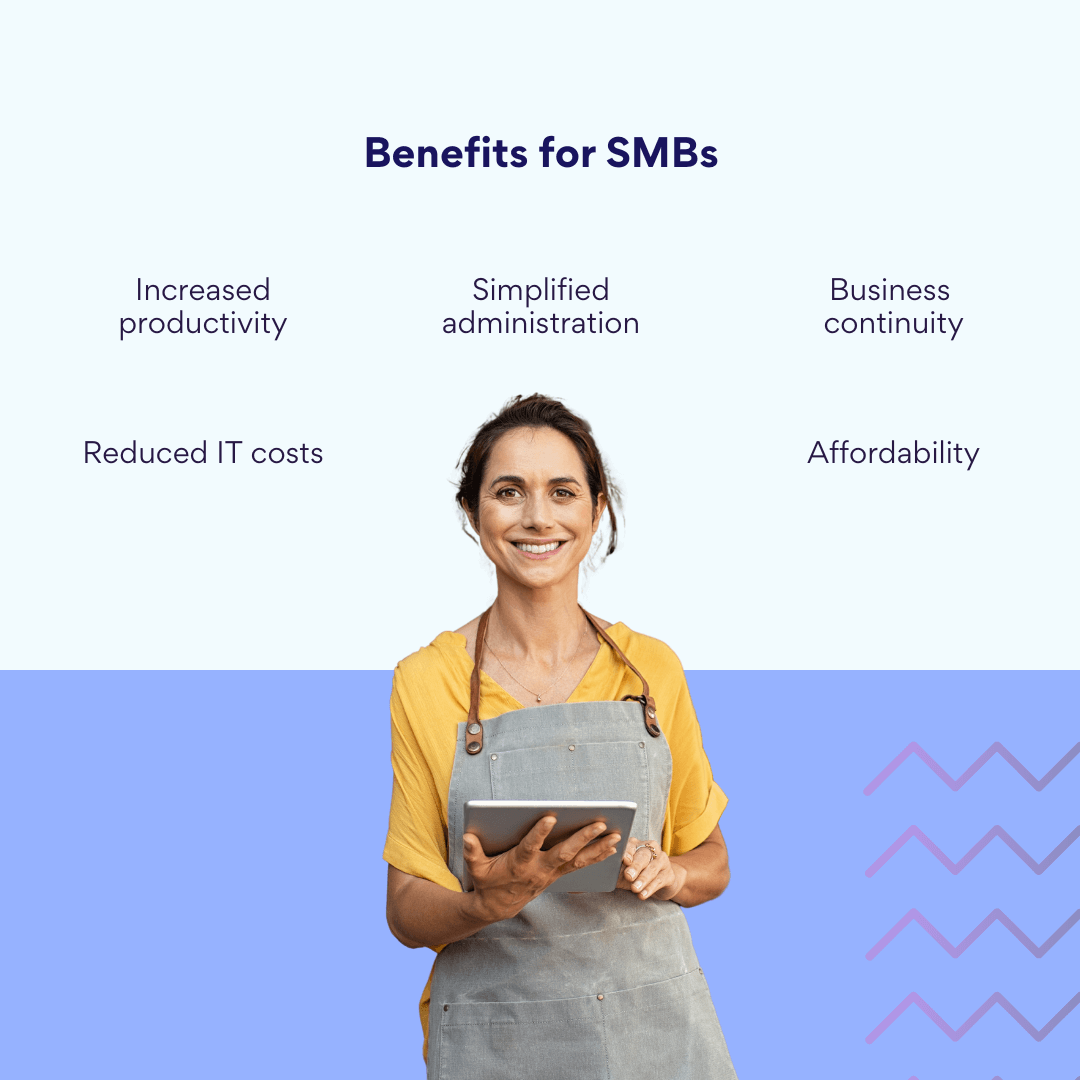
While businesses of all sizes benefit from Microsoft 365 Apps for Business, SMBs gain particular advantages:
- Reduced IT costs: Cloud-based tools eliminate the need for on-premises servers, reducing both capital and maintenance expenses.
- Enterprise-grade tools at SMB prices: Small businesses gain access to the same professional applications used by large enterprises, leveling the playing field.
- Increased productivity: Real-time collaboration, cloud storage, and integrated tools enhance team efficiency and output.
- Simplified administration: Centralized management reduces the burden on small IT teams or business owners managing technology themselves.
- Business continuity: Cloud-based services ensure operations can continue even during physical disruptions, like natural disasters.
Who Are Microsoft 365 Apps for Business Suitable For?
Finding the right productivity suite for your organization depends on understanding not just the features of available options, but also how well they align with your specific business needs. In this section, we’ll explore the ideal audience for Microsoft 365 Apps for Business and examine common scenarios where this solution excels.
Target audience
Microsoft 365 Apps for Business is designed with specific business profiles in mind, making it an excellent fit for various organizations:
Small businesses (1-50 employees): For small businesses looking to establish professional operations without significant IT overhead, Microsoft 365 Apps for Business provides enterprise-quality tools at an accessible price point. The straightforward administration and familiar Office applications make adoption simple, even for organizations without dedicated IT staff.
Medium businesses (50-300 employees): Medium-sized organizations often benefit from Microsoft 365 Apps for Business when they need reliable productivity tools without the complexity of enterprise solutions. As businesses grow toward the 300-user limit, they may consider transitioning to Microsoft 365 Business Premium for enhanced security or to Enterprise plans for larger deployments.
Freelancers and solo entrepreneurs: Independent professionals benefit from Microsoft 365 Apps for Business through access to professional-grade tools that enhance credibility with clients. The ability to work across multiple devices is particularly valuable for freelancers who often transition between home offices, client sites, and mobile work environments.
Organizations with remote or hybrid workers: With its emphasis on cloud storage and cross-device compatibility, Microsoft 365 Apps for Business is ideally suited for organizations embracing remote or hybrid work models. The seamless synchronization between devices ensures productivity isn’t compromised regardless of where employees are working.
Project-based teams: Teams that form and dissolve around specific projects appreciate the flexibility of Microsoft 365 Apps for Business. The subscription model allows organizations to scale licenses up or down as project requirements change.
Businesses with basic IT infrastructure: Organizations looking to minimize on-premises IT infrastructure find Microsoft 365 Apps for Business attractive as it shifts much of the technical burden to Microsoft’s cloud services.
Businesses transitioning from traditional office: Companies moving from perpetual Office licenses to a cloud-based model find Microsoft 365 Apps for Business provides a familiar experience while introducing new collaborative capabilities.
👉 Important note: Microsoft 365 Apps for Business is specifically designed for organizations with fewer than 300 users. Larger organizations should consider Microsoft 365 Apps for Enterprise or other Enterprise plans, which offer enhanced management capabilities and advanced security features tailored to larger deployments.
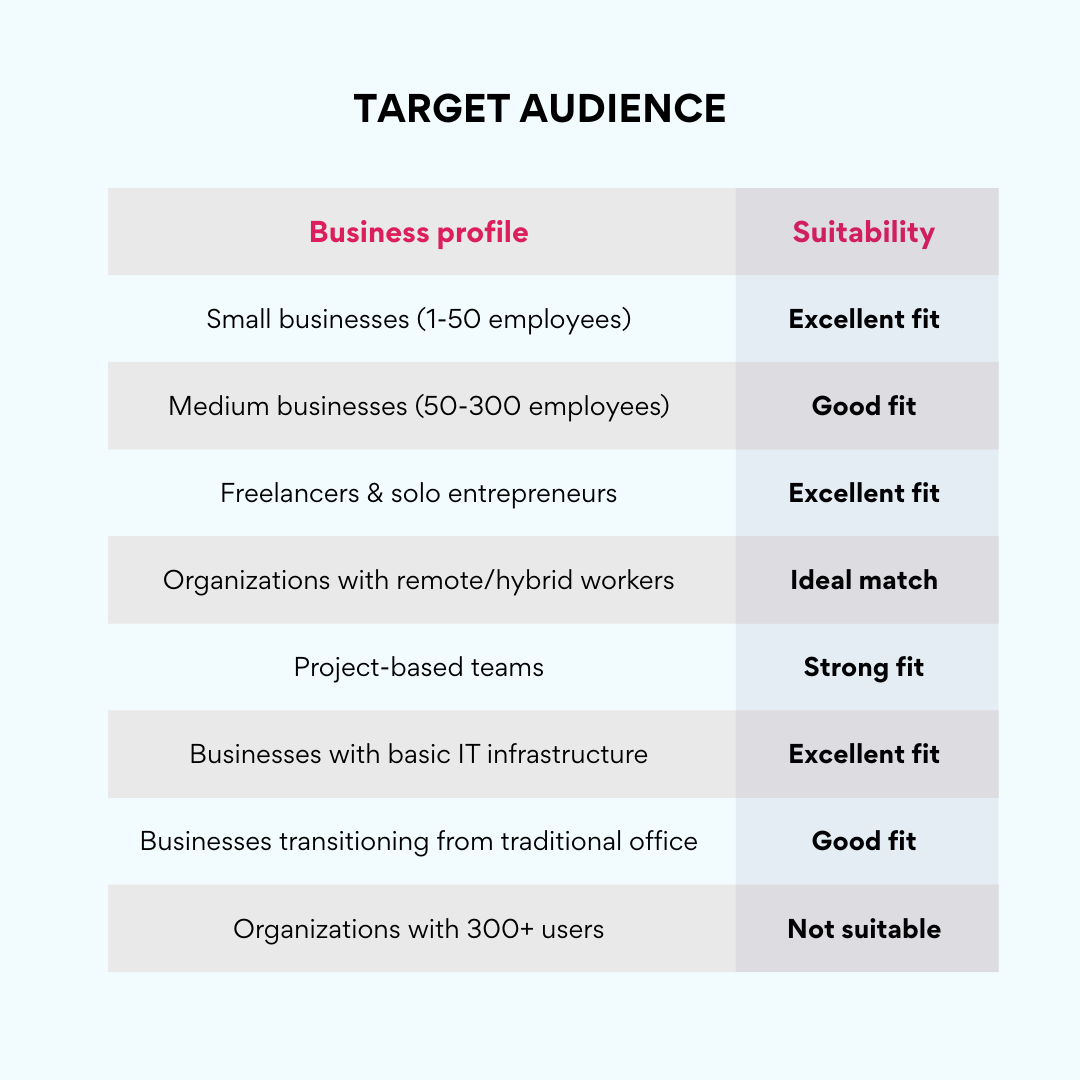
Use cases
Microsoft 365 Apps for Business shines in numerous real-world scenarios. Here are some of the most common and valuable use cases:
- Create and collaborate on documents
The core functionality of Microsoft 365 Apps for Business centers around document creation and collaboration:
- Versatile document creation: Users can create and edit professional documents, spreadsheets, and presentations using familiar Office applications, either through desktop applications or web browsers.
- Automatic saving and versioning: The AutoSave feature ensures work is continuously saved to the cloud, minimizing the risk of data loss. Version history allows teams to review or restore previous document iterations if needed.
- Real-time co-authoring: Multiple team members can simultaneously edit the same document, seeing each other’s changes in real-time. This dramatically accelerates collaborative work on time-sensitive deliverables.
- Contextual commenting and feedback: Team members can provide feedback directly within documents through comments, reducing the confusion often associated with email-based review processes.
These capabilities are particularly valuable when:
- Developing client proposals requiring input from multiple departments
- Creating and maintaining budgets with finance team collaboration
- Producing marketing materials with stakeholder review
- Drafting and refining standard operating procedures
- Preparing reports with data contributions from various team members
- File storage and sharing
Beyond document creation, Microsoft 365 Apps for Business provides robust file management capabilities:
- Generous cloud storage: Each user receives 1 TB of OneDrive storage, eliminating concerns about running out of space for business documents.
- Cross-device synchronization: Files automatically sync between devices, ensuring users always have access to the most current versions regardless of which device they’re using.
- Granular permission controls: Administrators and users can set specific access levels for files and folders, from view-only to full editing capabilities, maintaining appropriate security while enabling collaboration.
- External sharing options: Secure sharing links allow collaboration with clients, vendors, and partners outside the organization without requiring them to have Microsoft 365 subscriptions.
These storage and sharing features excel in scenarios such as:
- Collaborating with external contractors or consultants on specific projects
- Providing an accountant with access to financial records without exposing unrelated documents
- Maintaining a centralized repository for company templates, policies, and procedures
- Creating a secure client portal for delivering completed work and collecting feedback
- Communication and interaction via Microsoft Teams
When paired with Microsoft 365 Business Basic or Business Standard plans (which include Teams), Microsoft 365 Apps for Business becomes part of a comprehensive communication ecosystem:
- Structured communication: Teams provides organized conversation spaces through channels and chats, allowing communications to be categorized by project, department, or topic.
- Integrated meeting experiences: Video meetings with screen sharing capabilities keep remote team members connected, while integration with Office applications allows for seamless presentation sharing.
- Calendar and task synchronization: Teams connects with Outlook calendars, ensuring meeting information and availability are always current.
- Activity notifications: Updates about document edits and other collaborative activities can be automatically shared in relevant Teams channels, keeping everyone informed without manual updates.
These communication capabilities are particularly effective when:
- Managing distributed teams across multiple locations
- Coordinating cross-functional project teams
- Conducting client meetings and presentations remotely
- Maintaining ongoing departmental communication and updates
- Onboarding new team members through access to historical conversations and shared knowledge
Microsoft 365 Apps for Business provides the essential tools for document creation and collaboration that most small to medium businesses require. When combined with other Microsoft 365 services available in the Basic, Standard, or Premium plans, it forms a comprehensive productivity environment that adapts to diverse business needs while remaining approachable for organizations of all technical sophistication levels.
Security and Management of Microsoft 365 Apps for Business
Microsoft 365 Apps for Business integrates essential security and management capabilities that safeguard your business data while simplifying administration. This combination is particularly valuable for small and medium-sized businesses (SMBs) that may lack dedicated IT security teams but still face the same cybersecurity challenges as larger organizations.
Administration and management
Microsoft 365 Apps for Business provides streamlined yet powerful administrative capabilities through the Microsoft 365 Admin Center, a centralized web portal that serves as mission control for managing your subscription.
Centralized management through the Microsoft 365 Admin Center
The Admin Center offers a comprehensive suite of tools, allowing even non-technical administrators to efficiently manage their Microsoft 365 environment:
- User access configuration: Create, modify, and remove user accounts while precisely controlling access to company resources based on roles and responsibilities.
- License assignment and monitoring: Easily assign or reassign licenses as your team evolves, ensuring cost-effectiveness by allocating licenses only to active users.
- Security policy implementation: Set baseline security policies, such as password complexity requirements, file-sharing restrictions, and sign-in limitations, to protect your organization.
- Device management: Monitor and manage access to company resources from up to five devices per user, across Windows, macOS, iOS, and Android platforms.
This centralized approach eliminates the need for multiple interfaces or systems, making it easier to maintain a secure and efficient productivity environment.
User and device management
Beyond basic administration, Microsoft 365 Apps for Business simplifies day-to-day user and device management:
- Streamlined onboarding: Quickly add new employees using predefined templates and automated setup instructions.
- Self-service password reset: Empower users to reset passwords securely, reducing IT intervention and minimizing disruptions.
- Role modifications: Adjust user permissions as roles and responsibilities change within the organization.
- Enhanced device controls in Premium plans: Microsoft 365 Business Premium extends these capabilities with advanced device management, such as the ability to remotely wipe company data from lost or stolen devices while preserving personal information.
These management tools enable SMBs to maintain professional IT operations without requiring specialized expertise.
Data protection
Microsoft 365 Apps for Business incorporates multiple layers of data protection, ensuring business information remains secure and accessible.
Encryption and storage security
All Microsoft 365 plans, including Apps for Business, implement robust security measures:
- Encryption in transit: Data transmitted between devices and Microsoft’s servers is encrypted using industry-standard protocols, preventing interception.
- Encryption at rest: Files stored in OneDrive and other services are encrypted, protecting data even if physical storage systems are compromised.
- Multi-datacenter redundancy: Microsoft stores data across geographically distributed datacenters, ensuring availability even during regional outages.
These foundational protections would be costly and complex for small businesses to implement independently.
Threat protection
While more advanced threat protection is included in Business Premium, all Microsoft 365 subscriptions benefit from Microsoft’s enterprise-grade security infrastructure:
- Basic malware scanning: Files uploaded to OneDrive are automatically scanned for known threats.
- Authentication safeguards: Protection against password-based attacks, such as login monitoring and suspicious activity detection.
- Enhanced features in Premium plans: Microsoft 365 Business Premium includes advanced phishing protection, malicious attachment scanning, and ransomware recovery tools.
Data loss prevention (DLP)
Microsoft 365 provides tools to prevent accidental or intentional data leaks:
- Content scanning: Detect sensitive information patterns (e.g., credit card numbers, social security numbers, or custom-defined data) within documents.
- Policy enforcement: Automatically block sharing, require encryption, or notify administrators when sensitive content is detected.
- Audit logging: Log activities related to sensitive content for compliance and security reviews.
While DLP capabilities are more robust in Premium plans, basic plans include essential features to protect sensitive business information.
Backup and recovery
Microsoft 365 ensures data resilience with built-in backup and recovery features:
- Version history: OneDrive maintains previous versions of documents, allowing recovery from accidental changes or deletions.
- Recycle bin functionality: Deleted files are stored in a recycle bin for a defined period before permanent deletion.
- Service-level data protection: Microsoft maintains multiple copies of your data to protect against hardware failures.
- Azure Backup integration: Businesses needing advanced backup solutions can integrate with Azure Backup services for additional recovery options.
Integration with Azure Active Directory
Microsoft 365 Apps for Business integrates with Azure Active Directory (Azure AD) to provide enterprise-grade authentication and identity management:
- Centralized identity management: Manage user credentials from a single location, simplifying administration and enhancing security.
- Single sign-on (SSO): Users can access multiple applications with one set of credentials, improving convenience and reducing password fatigue.
- Multi-factor authentication (MFA): Add an extra layer of security by requiring a second authentication factor beyond passwords.
- Conditional access (Premium plans): Access to company resources can be restricted based on device compliance, user location, and risk levels.
This integration lays the foundation for more sophisticated security measures as your business grows.
Security differences across plans
Microsoft 365 Apps for Business and Basic/Standard Plans
- Provide fundamental security features like data encryption, basic threat protection, and essential administrative controls.
- Deliver sufficient protection for most SMBs with standard security requirements.
- Offer a balance between security and simplicity, making them ideal for businesses without dedicated IT teams.
Microsoft 365 Business Premium
- Adds advanced threat protection against sophisticated attacks like phishing and ransomware.
- Includes comprehensive device management with conditional access policies.
- Offers enhanced DLP features for regulatory compliance and sensitive data protection.
- Provides ransomware recovery tools and advanced compliance solutions.
For SMBs with standard security needs, Microsoft 365 Apps for Business offers an appropriate level of protection. However, organizations handling highly sensitive data or operating in regulated industries may benefit from the advanced features of M365 Business Premium.
Expanding M365 Capabilities with VirtoSoftware Solutions
While Microsoft 365 provides a robust foundation for business productivity, many organizations find they need specialized tools to address specific workflows or enhance particular aspects of collaboration. This is where third-party solutions like VirtoSoftware enter the picture, offering purpose-built applications that seamlessly integrate with and extend the Microsoft 365 ecosystem to meet unique business requirements.
Extend M365 Functionality with VirtoSoftware’s Apps
Beyond standard Microsoft applications
The standard Microsoft 365 applications deliver excellent core functionality, but they’re designed to serve a broad audience with general-purpose tools. As businesses evolve and refine their processes, they often encounter workflow challenges or efficiency opportunities that require more specialized solutions.
VirtoSoftware has developed a comprehensive suite of business applications specifically designed to:
- Seamlessly integrate with Microsoft Teams, SharePoint Online, and Outlook
- Extend core functionality for specialized task management, calendar coordination, and business process optimization
- Provide customization options that allow tailoring Microsoft 365 to specific business workflows
- Maintain the familiar Microsoft interface while adding powerful new capabilities
- Operate within Microsoft’s security framework to ensure data protection
These solutions enable businesses to build upon their Microsoft 365 investment rather than replacing it, creating a cohesive digital workspace that combines Microsoft’s reliability with task-specific enhancements.
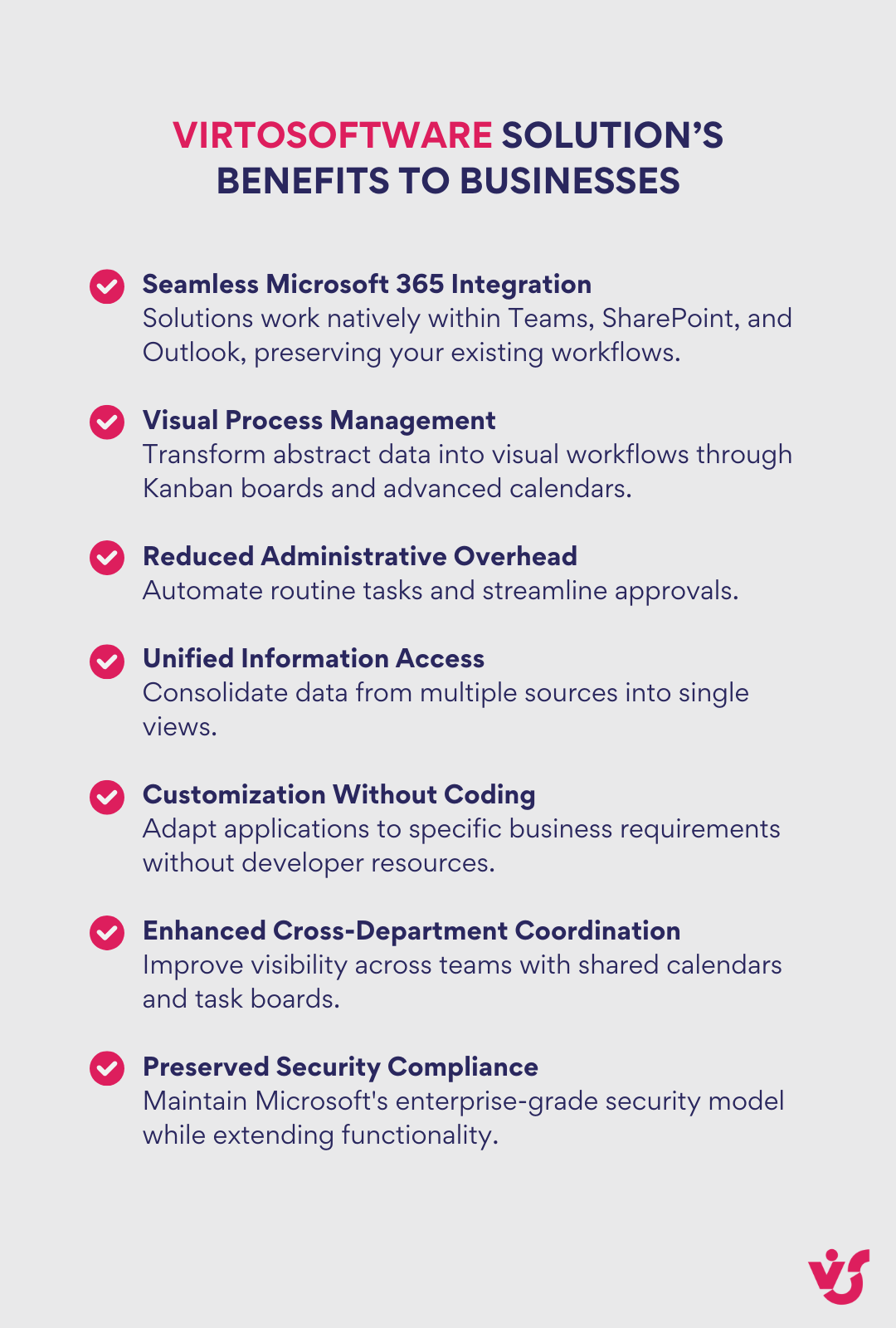
Key VirtoSoftware solutions for Microsoft 365
Let’s explore some of VirtoSoftware’s most popular applications that expand Microsoft 365 capabilities:
Virto Kanban Board
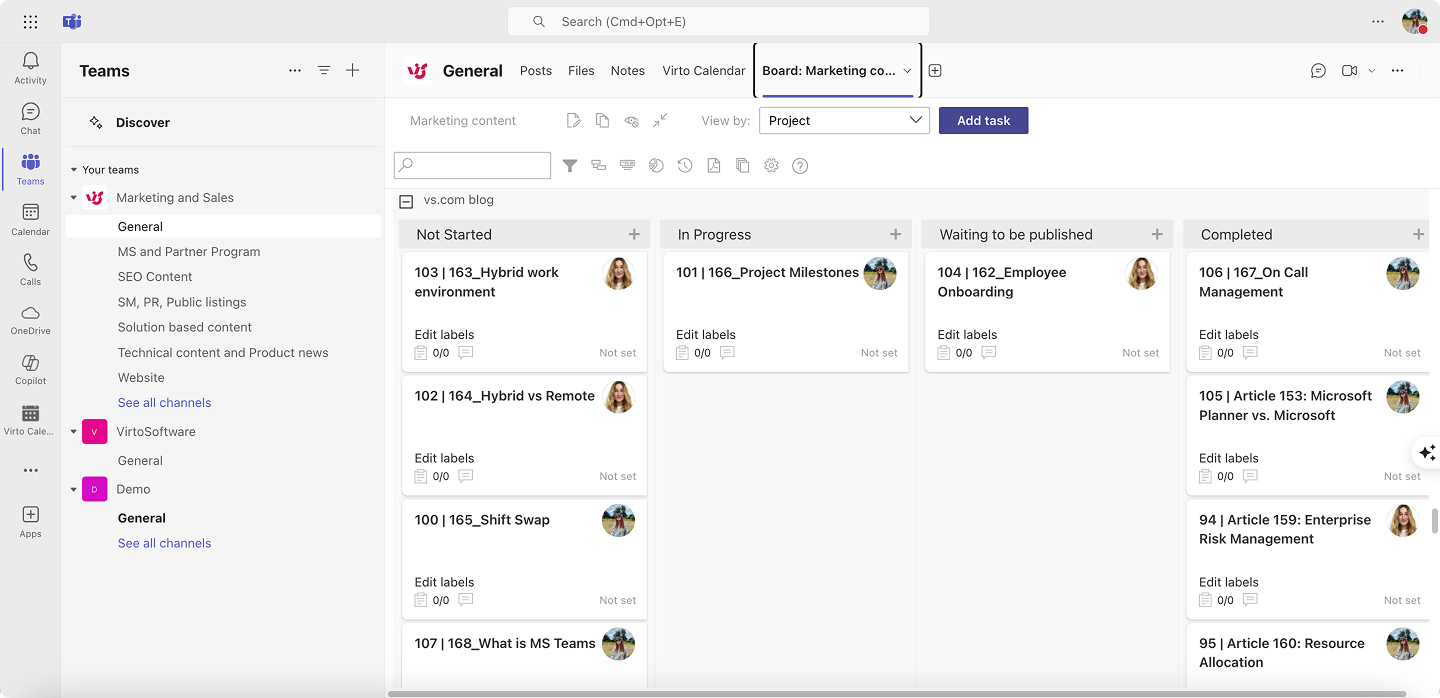
The Virto Kanban Board App transforms task management in Microsoft 365 by introducing visual workflow organization based on Kanban methodology. This application:
- Converts SharePoint lists into interactive Kanban boards with customizable columns that represent workflow stages
- Supports swimlanes for categorizing work by project, department, or any custom criteria
- Includes WIP (Work in Progress) limits to prevent workflow bottlenecks
- Offers color-coding and tagging for improved visual organization
- Integrates directly into Microsoft Teams channels, bringing visual task management into team communication spaces
- Provides subtask functionality for breaking down complex work items
This visual approach to task management is particularly valuable for teams that need to track work as it progresses through different stages, such as development teams using agile methodologies or marketing departments managing campaign workflows.
As highlighted in the documentation, Virto Kanban Board offers advanced task management “designed to adapt to your workflow” while maintaining native integration with the Microsoft 365 ecosystem, ensuring a consistent user experience.
Virto Calendar App
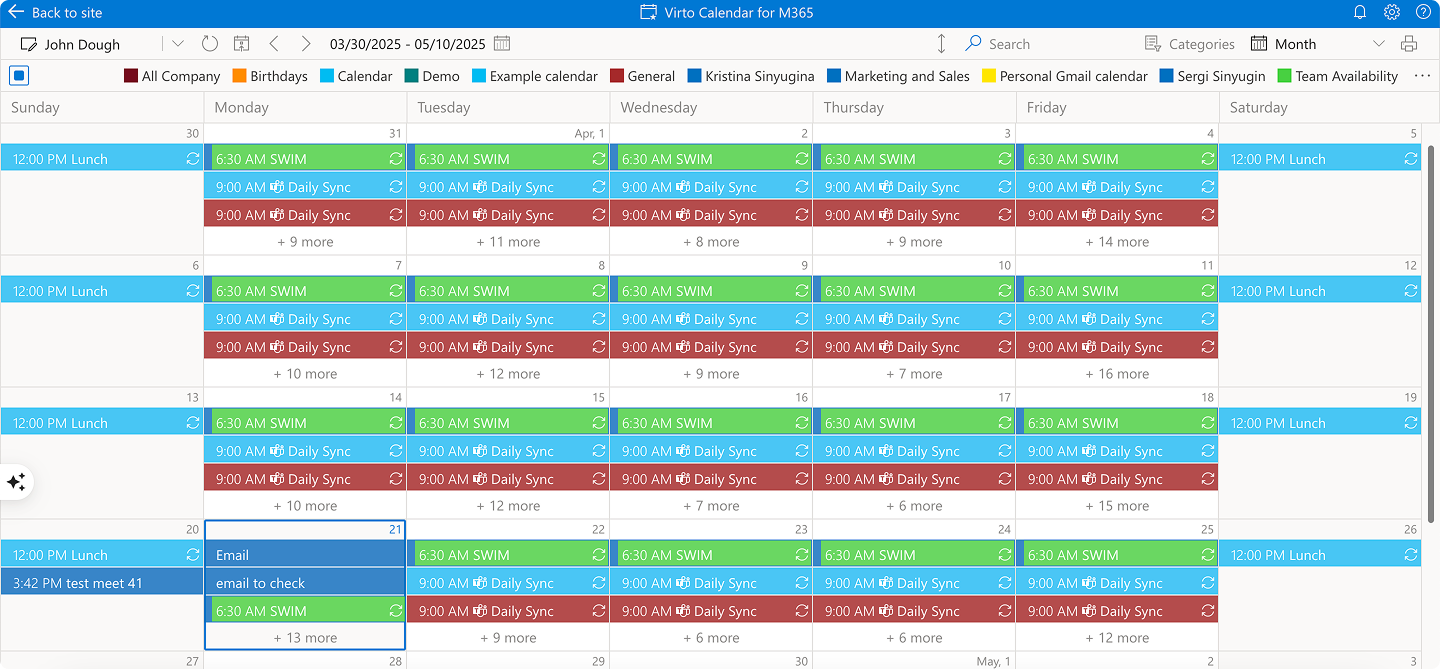
The Virto Calendar App solves one of the most common challenges in organizational scheduling—the need to view and coordinate multiple calendars from different sources. This solution:
- Merges calendars from SharePoint, Exchange/Outlook, Google Calendar, and iCal feeds into a single, comprehensive view
- Supports color-coding for easy identification of event sources and categories
- Offers multiple viewing options including day, week, month, and timeline perspectives
- Functions as a central scheduling hub for coordinating team activities
- Integrates directly into Microsoft Teams for in-context schedule viewing
- Maintains SharePoint’s security model, ensuring users only see events they have permission to access
This consolidated calendar view is invaluable for teams coordinating complex schedules across departments or for organizations balancing multiple project timelines simultaneously. According to the product documentation, Virto Calendar creates a “central scheduling hub, simplifying planning and coordination across projects and teams.”
Virto Form Designer
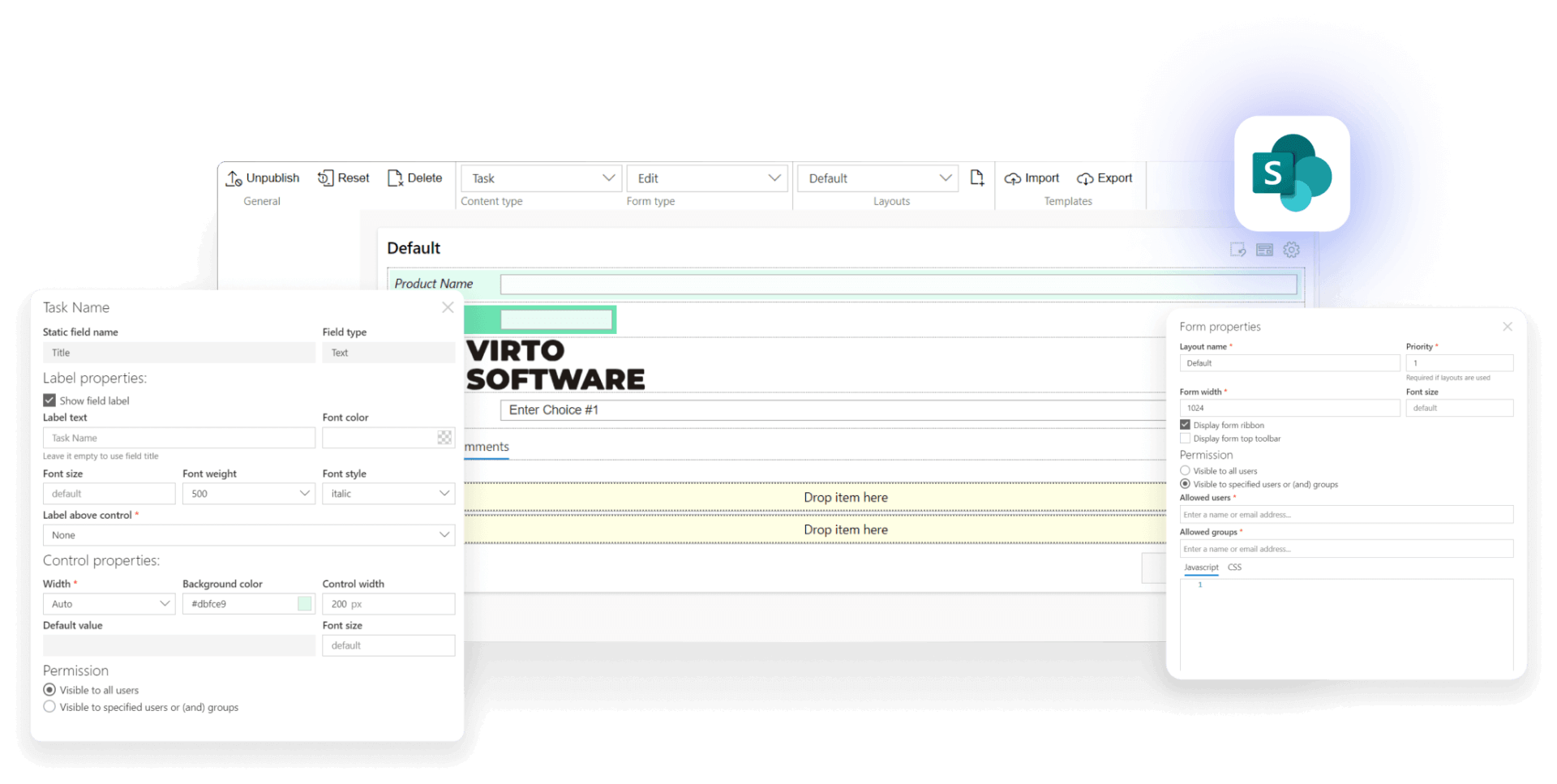
The Virto Form Designer enhances data collection and entry within SharePoint Online by providing sophisticated form creation capabilities that go beyond SharePoint’s native options. This application:
- Features a no-code, drag-and-drop interface for building custom forms
- Supports advanced layouts with multiple columns, tabs, and sections
- Allows for conditional logic to show or hide fields based on user selections
- Enables the creation of lookup fields that pull data from other SharePoint lists
- Supports three types of forms (display, edit, new) based on content type within the same SharePoint list
- Maintains SharePoint’s security model for controlled access to sensitive information
Form Designer addresses the common business need for structured data collection while maintaining the benefits of storing that data within SharePoint. As noted in the documentation, this creates a seamless experience with “advanced layout options and text controls” while enforcing “security and permissions to control field visibility among users.”
Business benefits of VirtoSoftware solutions
Implementing VirtoSoftware’s specialized applications alongside Microsoft 365 delivers several meaningful business advantages:
- Improved productivity through streamlined, visual workflows that reduce time spent on administrative tasks
- Enhanced collaboration by making information more accessible and visual for team members
- Reduced context switching by keeping specialized tools within the Microsoft 365 environment
- Lower training requirements due to the familiar Microsoft interface design
- Simplified IT management with solutions that leverage existing Microsoft security and administration
- Accelerated process improvement by providing tools that adapt to evolving business needs
These applications are particularly valuable for businesses looking to automate routine processes, improve team coordination, or enhance information visibility across the organization.
Explore VirtoSoftware’s Use Cases for Businesses Like Yours
Getting started with VirtoSoftware
Each VirtoSoftware application offers a 14-day free trial period, allowing organizations to test these enhanced capabilities within their existing Microsoft 365 environment before making a commitment. The pricing models are designed to scale with business size, with options suitable for small teams up to enterprise organizations.
For businesses already invested in Microsoft 365, VirtoSoftware’s solutions represent a logical extension that preserves existing workflows while addressing specific productivity challenges. By maintaining native integration with Microsoft’s ecosystem, these applications enhance rather than disrupt the digital workplace, making them an attractive option for organizations seeking to maximize their Microsoft 365 investment.
Whether your organization needs better visual task management, more comprehensive calendar coordination, or enhanced data collection capabilities, VirtoSoftware’s Microsoft 365 applications provide specialized tools that help transform standard productivity into optimized business processes.
We encourage you to browse the site to download the free trials of those apps, schedule a quick demonstration call to see them for yourself, or ask any relevant questions.
Conclusion
Microsoft 365 Apps for Business represents an ideal productivity solution for small and medium-sized businesses seeking powerful tools without overwhelming complexity or cost. At just $8.25 per user/month (with annual commitment), this subscription-based service provides access to the essential Microsoft desktop applications—Word, Excel, PowerPoint, and Outlook—along with 1 TB of OneDrive cloud storage per user and compatibility across multiple devices.
The plan strikes an effective balance between functionality and simplicity. Unlike more comprehensive Microsoft 365 subscriptions that include email hosting, Teams collaboration, and enhanced security features, Microsoft 365 Apps for Business focuses on delivering the core productivity applications that form the foundation of daily business operations. This focused approach makes it particularly suitable for organizations that already have email and collaboration solutions in place or those with straightforward productivity needs.
When selecting the right Microsoft 365 plan, your decision should be guided by your specific business requirements. Microsoft 365 Apps for Business is ideal for companies with up to 300 users who need desktop Office applications and cloud storage. For businesses requiring additional services like business email, Teams collaboration, or enhanced security features, upgrading to Microsoft 365 Business Basic, Standard, or Premium may be more appropriate. Remember that all business plans support a maximum of 300 users—larger organizations should consider enterprise-level solutions.
While Microsoft 365 Apps for Business provides a solid productivity foundation, many organizations benefit from extending these capabilities through specialized solutions like those offered by VirtoSoftware. Our SharePoint and Microsoft 365 extensions—including the Kanban Board App for visual task management, Calendar App for comprehensive scheduling, and Form Designer for customized data collection—can significantly enhance your Microsoft 365 environment. These tools provide tailored solutions for specific business processes that standard Microsoft applications may not fully address.
We encourage you to continue exploring Microsoft 365’s capabilities through these official Microsoft resources:
- Microsoft 365 Apps for Business
- Microsoft 365 for Business
- Microsoft 365 Products, Apps, and Services
- Microsoft 365 Products for Business
- Microsoft 365 Apps Licensing Resources
- Compare All Microsoft 365 Business Plans
For additional insights and specialized solutions to extend your Microsoft 365 environment, our blog offers numerous articles on optimizing SharePoint Online and Microsoft 365:





